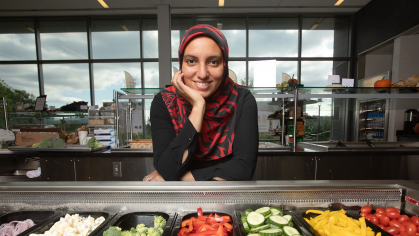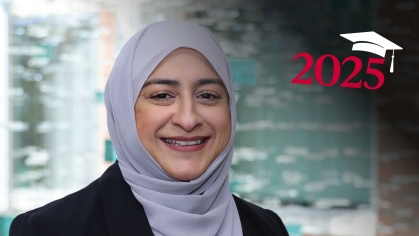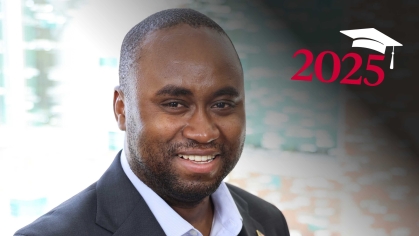From NCAA athlete to sustainability professional, Lou Mialhe, MPH ’24, is redefining how sport can serve as a catalyst for health and environmental impact

As climate change continues to affect communities and industries worldwide, the intersection of sustainability and public health has become increasingly vital. For Lou Mialhe, who earned a Master of Public Health (MPH) in Environmental Health Sciences from the Rutgers School of Public Health, this intersection comes to life through sport.
A sustainability professional at New York Road Runners – the nonprofit behind the TCS New York City Marathon – Mialhe works to embed climate-conscious practices across one of the world’s largest running organizations. Her journey reflects how Rutgers School of Public Health alumni are redefining what it means to promote health in a changing environment.
Through this conversation, Mialhe shares her path from student-athlete to sustainability leader, her perspective on the link between climate and health, and her advice for those eager to make a similar impact.
---
Tell us about your background and what led you to pursue your degree at the Rutgers School of Public Health.
I am a French-American sustainability professional currently working at New York Road Runners (NYRR), a New York City–based nonprofit dedicated to transforming the health and well-being of NYC communities through inclusive and accessible running experiences like the TCS New York City Marathon, as well as 60 annual adult and youth races.
Public health extends far beyond its textbook definition – it encompasses community, connection, emotion, well-being, with equity and justice at its core, tying all these themes together.
Lou Mialhe
Rutgers School of Public Health Alumna, MPH '24
As an undergraduate in the Bloustein School of Planning and Public Policy, I chose to major in Public Health and minor in Spanish. In August 2020, I found myself graduating on Zoom from my childhood home, a few months after my final semester on campus was cut short by the sudden onset of the COVID-19 pandemic.
As I navigated the uncertainty of this time period, unsure of where my career would lead and feeling that my first four years as a 3-sport NCAA athlete had been left unfinished, everything seemed to align when I was given the opportunity to utilize my redshirt years as a graduate student on the Track & Field team.
During my Master’s program, I chose a concentration in Environmental Health Sciences based on both personal interest and career opportunity. In courses such as Health Systems & Policy and Social & Environmental Health Sciences, I learned about regulatory programs related to environmental and community protection, as well as major environmental health problems facing the public, through specific lenses on vulnerable or susceptible subpopulations.
I also enjoyed Biostatistics and Environmental Risk Assessment, as those courses tapped into my curiosity for analyzing numbers and patterns. Dr. Laumbach, who served as my faculty advisor during my capstone, supported my curiosity throughout my studies and consistently encouraged me to explore a future in sustainability within the sports industry.
In my current role, I am focused on integrating sustainable practices into the sports industry – whether through strategic initiatives, innovative solutions, or collaborative efforts – to create a lasting positive impact on both global sport and the planet.
What inspired your commitment to sustainability and public health?
As a varsity student-athlete at Rutgers, I had firsthand experience with how climate change was impacting my sport – canceled races due to heatwaves, flooded cross-country courses, snow in October, and hurricanes in the South as early as April.
These experiences helped me recognize that climate change poses one of the greatest long-term threats to the existence of organized sport. Across every level, from youth to professional, sport is deeply tied to health and wellness, promoting fitness as a way to prevent illness and build lifelong well-being. I also noticed that sport is not only a victim of climate change but also a contributor – through frequent charter flights for small college teams, the prevalence of single-use gear, and the casual overuse of medical examinations, each of which carries its own environmental footprint through material use and energy-intensive procedures.
My background in public health, combined with my experience as an athlete, ultimately opened the door for me to pursue a career in sustainability within the sports sector.
Why do you believe sustainability is an essential part of public health today?
Public health extends far beyond its textbook definition – it encompasses community, connection, emotion, well-being, with equity and justice at its core, tying all these themes together.
Similarly, sport is bigger than learning to kick a ball or training for years to become the one who eventually wins an Olympic medal, because while only a few thousand athletes compete at the Olympics, billions around the world find connection and joy through these shared experiences. Sport, across the globe, has the potential to be that accessibility factor in public health, serving as a means of connection and well-being. This, in my opinion, is a core tenet of modern public health, encompassing everything from cardiovascular fitness to sociological connection and mental clarity.
With climate change increasingly impacting sport at every level, sustainability plays a crucial role in protecting something that brings health, joy, and connection to people from diverse cultures and backgrounds, transcending cultural, linguistic, and socioeconomic barriers.
Can you share an example of how sustainable practices have created measurable change in your work?
Entries for the seven Abbott World Marathon Majors are highly sought-after; runners from around the world dream of earning a spot, and only a lucky few get the chance to participate. But with the global running boom, the sport is in a unique position to leverage that popularity to expand the impact of its events. New York Road Runners, a nonprofit offering free running experiences to underserved communities in NYC, recognized this opportunity and launched a new sustainability movement within the running world.
In 2024, I was fortunate to be part of the team that developed and launched the first Abbott World Major Marathon race entry method tied to sustainability efforts, the NYRR Team for Climate. Through this program, in partnership with Anew Climate, NYRR committed to using a portion of the funds raised by these runners to purchase verified carbon credits for improved forest management projects, a practice known as carbon offsetting. In addition, NYRR is also committed to using a portion of the funds raised for projects within NYRR that reduce the total emissions generated within events and operations, a practice known as carbon insetting.
Championed by runners for runners, it brings together all kinds of people, whether they’re just starting to learn about sustainability or dedicated climate advocates, to deepen the link between health, running, and sustainability. In its first full year, the program achieved incredible success—runners fundraised more than $1 million, which was enough to offset the carbon footprint of all three of NYRR’s marquee events: the TCS New York City Marathon, the United Airlines NYC Half, and the RBC Brooklyn Half.
This work comes with its challenges, but when I take a step back and pause, thinking of the moments when runners have told me or shown me that their experience with the NYRR Team for Climate helped them find a deeper sense of belonging, purpose, health, and climate advocacy, I’m reminded why this work is so meaningful and impactful.
What advice do you have for students or professionals interested in building a career at the intersection of sustainability and health?
First, start by connecting with people you can learn from, not just those who seem to be directly aligned with your long-term goals. If you feel a natural affinity toward someone, even in a totally different field, take the time to explore why that connection exists and how it might lead somewhere meaningful. Sustainability and public health themes are incredibly intertwined; there is always something to connect with someone. Explore those connections!
Second, build your portfolio with projects that push you to learn and grow. In today’s world, that might mean taking on work without pay, but those experiences often prove to be the most valuable. Learn to recognize where something may be missing or could be improved and take the initiative to offer a plan for improvement with tangible solution ideas. These experiences show that you’re willing to take initiative and commit to something because it truly interests you. That kind of drive and authenticity is what people hiring in sustainability and public health are looking for—it’s what this type of work requires.
---
For those inspired to make an impact in this growing field, the Rutgers School of Public Health’s new Master of Science in Sustainability and Health offers an opportunity to develop the skills to think critically and systemically about the interconnections and interdependencies between human health and the health of the planet.


